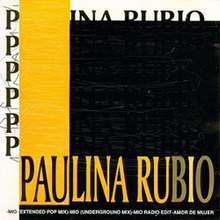Mío
"Mío" is a song recorded by Mexican singer Paulina Rubio from her debut studio album La Chica Dorada (1992). It was written by José Ramón Flórez and Cesar Valle and produced by Miguel Blasco and J.R. Florez. After recording and sending a demo tape, Rubio signed a multi-album deal with EMI Capitol de México in June of 1992.[3] "Mío" is a dance-pop song that refers to a girl's passionate feelings.
| "Mío" | ||||
|---|---|---|---|---|
 | ||||
| Single by Paulina Rubio | ||||
| from the album La Chica Dorada | ||||
| B-side |
| |||
| Released | August 30, 1992[1] | |||
| Studio | Balu-Balu (Madrid, Spain) | |||
| Genre | ||||
| Length | 3:46 | |||
| Label | Capitol, EMI Latin | |||
| Songwriter(s) |
| |||
| Producer(s) |
| |||
| Paulina Rubio singles chronology | ||||
| ||||
| Music video | ||||
| "Mío" on YouTube | ||||
"Mío" was released on August 30, 1992 through Capitol Latin. It reached number one in at least 12 countries, including Mexico, where it earned gold certification[4] and became the country's best-selling song of 1993. An accompanying music video, directed by Ángel Flores, portrays Rubio as a young femme fatale which is filmed by her crush, and starts to daydream that she is singing and dancing around him, while watching her love interest from afar.[5] It was also nominated for Favorite Video at the 1993 ERES Awards. "Mío" is one of the most emblematic songs of the 90s in Spanish, according to music videos channel VH1.[6]
In the United States, the song reached the number 3 on the Billboard Hot Latin Tracks and stayed there for four consecutive weeks.[7] Thanks to the success of the song, "Mío" is considered as one of the best songs in the 1990s in Mexico, while it is considered Paulina's biggest hit during the decade.
According to the media and fans, "Mío" has been considered as Paulina Rubio's signature song. To commemorate Rubio's lasting impact on the industry and her 25 years of carerr, Lucas Villa of AXS considered "Mío" as 10 of her best singles. He said "is quintessential '90s and, most importantly, signature Paulina Rubio" [8]
Background and composition

After the success with the band Timbiriche in the '80s decade, where recording ten studio albums, among them Timbiriche VII (1987), which is considered one of the best-selling records in Mexico,[9] Rubio traveled to Madrid to work with Miguel Blasco, José Ramón Flórez, Cesa Valle and Gian Pietro Felisatti, a successful Spanish production and writing team. They knew little about Rubio and knew that she wanted to make her solo debut; as a result, they wrote several cliché pop songs for their debut album at the end of 1991.
J. R. Flórez, was known in Mexico for writing for other female singers such as Yuri, Lucero and Alejandra Guzmán at her request, he was also known for writing the song "Hey Güera" by Guzman, dedicated to Paulina Rubio because she had interposed between the relationship of Guzman and Erik Rubin, who at that time was her boyfriend. In response to Guzman, Rubio asked J.R. Florez and Cesar Valle to write the response to "Hey Güera", At their request, the song writers made "Mío".[10] Rubio recorded the song at the Balu-Balu studios in Madrid, Spain and at the end of the recording session of the album, she have returned to Mexico to continue working on the telenovela, Baila Conmigo.
In June 1992, Paulina Rubio signed with the multinational company EMI Capitol, to start her solo career with a major internationalization project and her debut "Mío" was released on August 30 of that year when she was twenty-one years old. Previously, the record label released the song "La Chica Dorada" as a way to make Rubio known in the music industry as her new stage as a solo artist.
"Mío" is a dance-pop–oriented song that presents elements of soul music (chorus) and influences new jack swing and new wave music. The instrumentation of the song has synthesizers, keyboards and guitars. As for the lyrics of the song, according to several entertainment journalists, "Mío" contains concrete, direct and elegant phrases. [11]
Music video
The music video for "Mío" was directed by Ángel Flores and filmed in July 1992 at la Ciudad de México. [5] The video features Rubio walking through of some courtains, with scenes of her dancing and seducing a handsome man, played by José Cabalán Macari, who happens to be the cameraman. This video presented a sexy, seductive and dangerous of one young "femme fatale" image to the public, with scenes of Rubio posing in different poses y sophisticated movements to the camera.
The video premiered in the Mexico in September 1993. It was also nominated for Favorite Video at the ERES Awards in january 1993.
Track listing and formats
These are the formats and track listings of major single releases of "Mío".
- Mexico Vinyl, 7", Single, Promo[12]
- "Mío" – 3:33
- "Mío (Instrumental)" – 3:33
- Mexico 7" Single, 45 RPM Single[13]
- "Mío" – 3:33
- "Sabor A Miel" – 3:53
- Mexico 12" single, 33 ⅓ RPM, Promo[14]
- "Mío (Extended Pop Mix)" – 5:22
- "Mío (Underground Mix)" – 5:22
- "Mío (Radio Edit)" – 4:22
- Mexico CD, Single, Vinyl, 12", 33 ⅓ RPM, Maxi-Single[15]
- "Mío (Extended Pop Mix)" – 5:22
- "Mío (Underground Mix)" – 5:22
- "Mío (Radio Edit)" – 4:22
- "Amor De Mujer (Remix)" – 7:53
|
Live performances
Rubio performed the song on the following concert tours:
- Mío Tour
- La Chica Dorada Tour
- 24 Kilates Tour
- El Tiempo Es Oro Tour
- Planeta Paulina Tour
- Paulina World Tour
- Border Girl Tour
- Pau-Latina Tour
- Amor, Luz y Sonido Tour
- Gran City Pop Tour
- Brava! World Tour
- Deseo Tour
The song was also performed on:
- Paulina Rubio & Friends a 2011 TV special
Credits and personnel
- Paulina Rubio - lead vocals
- José Ramón Flórez - Composer, Songwriter
- César Valle - Songwriter
- Miguel Blasco - engineering, Music director, Executive producer
- Luis Méndez - Art Direction
Charts and certifications
ChartsWeekly charts
Year-end charts
|
Certifications
|
References
- "El Planeta de Paulina Rubio". El Tiempo. Retrieved January 21, 2019.
- "Allmusic - Paulina Rubio Mio [Single]". allmusic.com. Retrieved 2 October 2019.
- "Paulina Rubio, Biography" (in Spanish). Fan site (1995). 1995. Archived from the original on April 14, 2019. Retrieved April 30, 2019.
- Mayer, Dana (March 13, 1993). Magic's In The Music, And The Music's In These. Billboard. Retrieved February 11, 2019.
- "IMVDb Angel Flores". IMVDb. Retrieved December 1, 2018.
- "Las 100 Grandiosas Canciones de los 90 En Español Por VH1". Taringa!. May 11, 2011. Retrieved October 8, 2018.
- "HOT LATIN SONGS". Billboard. February 13, 1993. Retrieved October 8, 2018.
- Villa, Lucas (August 21, 2017). "25 years of Paulina Rubio: Counting the Latin queen's top 10 singles". AXS Contributor. Retrieved January 22, 2019.
- "Los 10 álbums más vendidos en México de la historia". thehappening.com. August 14, 2015. Retrieved April 30, 2019.
- "7 épicas rivalidades entre músicos latinos". E!. October 29, 2017. Retrieved April 30, 2019.
- Tobilla, Jessica (September 11, 2011). ""Los Escándalos del ayer"…". mipuntodevista.com (in Spanish). Retrieved April 30, 2019.
- "Vinyl, 7", Single, Promo". Discogs. 1992. Retrieved October 14, 2018.
- "Vinyl, 7", 45 RPM, Single". Discogs. 1992. Retrieved October 14, 2018.
- "Vinyl, 12", 33 ⅓ RPM, Promo". Discogs. 28 Aug 1992. Retrieved October 14, 2018.
- "Paulina Rubio – Mío". Discogs. 28 Aug 1992. Retrieved October 14, 2018.
- "Vinyl, 12", 33 ⅓ RPM, Maxi-Single". Discogs. 1992. Retrieved October 14, 2018.
- "Paulina Rubio Chart History (Hot Latin Songs)". Billboard. Retrieved 30 April 2020.
- "The Year in Music". Billboard: YE-58. December 25, 1993.